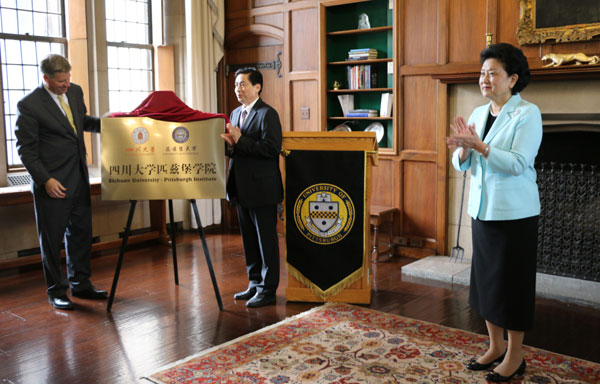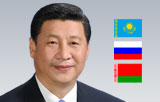Sichuan and Pittsburgh unveil new school
By CHEN WEIHUA in Pittsburgh and HUANG ZHILING in Chengdu, Sichuan (China Daily USA) Updated: 2015-06-21 12:10
 |
|
Chinese Vice-Premier Liu Yandong, right, applauds when University of Pittsburgh President Patrick Gallagher and Sichuan University President Xie Heping unveiled the plate for the Sichuan University - Pittsburgh Institute. The joint venture institute, located at Chengdu of China's Sichuan province, will start this fall with 100 students. It aims to have 1,600 students in seven years, according to Gallagher. The event held at the University of Pittsburgh on Friday afternoon is a series of events Liu will attend in the US before the 6th China-US High-Level Consultation on People-to-People Exchange, which will officially kick off in Washington on June 23 by Liu and US Secretary of State John Kerry. Chen Weihua/China Daily |
Sichuan University and the University of Pittsburgh unveiled a joint engineering institute at a ceremony in Pittsburgh,under the witness of Chinese Vice-Premier Liu Yandong.
Both University of Pittsburgh Chancellor Patrick Gallagher and Sichuan University President XieHepingtook part in the plate unveiling ceremony on Friday.
Gallagher said the institute has unique features.
"While virtually allmajor US joint institutes in China are located in coastal areas, Sichuan (University) Pittsburgh Institute is the first major US joint institute located in western China,a critical region forChina's future," he said.
He also described the new school as the only US joint institute in China that focuses on advanced and sustainable manufacturing.
The institute, which will welcome its first 100 students this fall, will offer academic majors in industrial engineering, chemical engineering and material science engineering.
"As sustainable manufacturing is a key question for the world today,t.he institute will provide a perfect platform for China and the United States to collaborate in these fields," Gallagher said. The institute will emphasize innovation, design and active learning and follow the successful experience of the University of Pittsburgh's engineering school, he added.
In seven years, the student body will grow to 1,600. Some students at the institute will come to the University of Pittsburgh during their sophomore or junior year to study, according to Gallagher.
Gallagher and Provost Patricia Beeson will go to Chengdu in September to welcome the first group of students.
"We are very excited about this partnership and look forward to working together in order to make Sichuan University Pittsburgh Institute one of the most advanced engineering education institutes in China and around the world," Gallagher said.
XieHeping, president of Sichuan University, said the new institute will take advantage of Sichuan University as a comprehensive university and Sichuan as the hub of manufacturing in Western China.
He said it will also take advantage of the University of Pittsburgh's advanced concepts in engineering education.
Xie believes that the University of Pittsburgh's research in advanced manufacturing and clean energy and the global reach of its board of directors can help the new institute become a high-level research institute and train high-level talent for the development of Western China and China's manufacturing industry.
The Sichuan University Pittsburgh Institute will bring the concept of internationalization to the 119-year-old university located in Chengdu, capital of Southwest China's Sichuan province, according to Wang Jie, deputy dean of the joint institute.
"Never before has Sichuan University instructed all the courses to a major in English. Neither has it hired all the teachers for a major from outside the country," Wang said.
According to Wang, the institute's dean is from Pittsburgh University. It has hired teachers from the United States and Europe who will teach the freshmen math, physics, chemistry and introduction to engineering in English. Teachers from Pittsburgh University will teach the students English," Wang said.
"All the curricula are the same as those taught at the University of Pittsburgh and the teaching method is the same as at the University of Pittsburgh. In a word, students on the campus of Sichuan University can learn what other Chinese students have to learn abroad," he said.
Wang said the management of its teachers is the same as at the University of Pittsburgh. "Teachers will not have a life-long tenure. They will have to leave if they are not promoted. At Sichuan University, teachers have a life-long tenure," he said.
The two partners started to talk about the joint institute three years ago. After seeking approval from the Ministry of Education in China, Sichuan University set up the institute on its campus last July.
"Pittsburgh University does not ask for any money from Sichuan University. It only wants excellent students from the Pittsburgh Institute to pursue the master's degree on its campus," Wang said.
Contact the writers at chenweihua@chinadailyusa.com and huangzhiling@chinadaily.com.cn
- Vice-Premier Liu Yandong addresses China-CEEC health ministers meeting
- Liu Yandong: Pay high attention to children’s health care
- Vice-Premier Liu Yandong attends China-France health strategic cooperation seminar
- Li Bin accompanies Vice Premier Liu Yandong on visit to Israel
- Liu Yandong and Israeli Prime Minister Benjamin Netanyahu witness signing of PoA on health emergency cooperation






